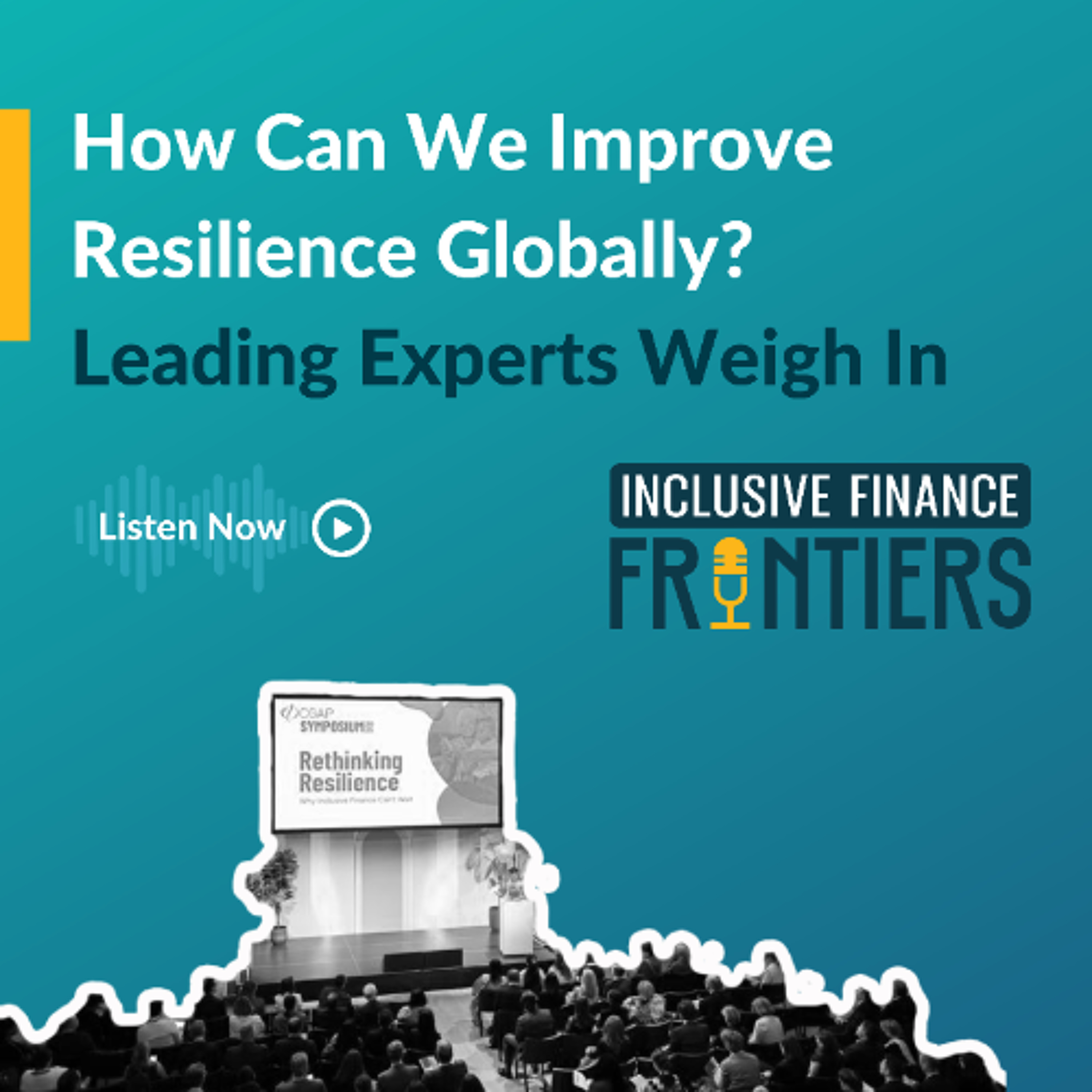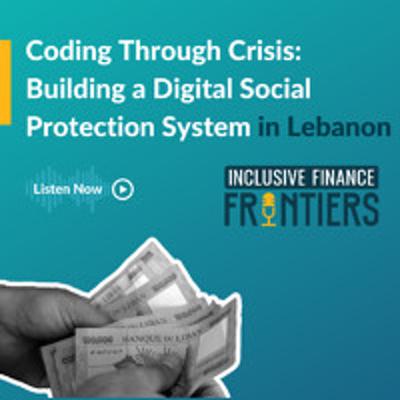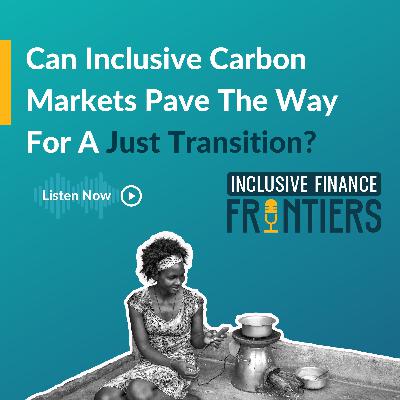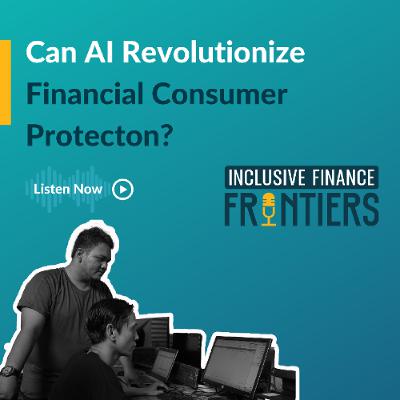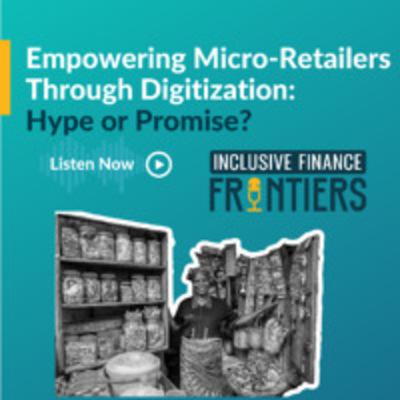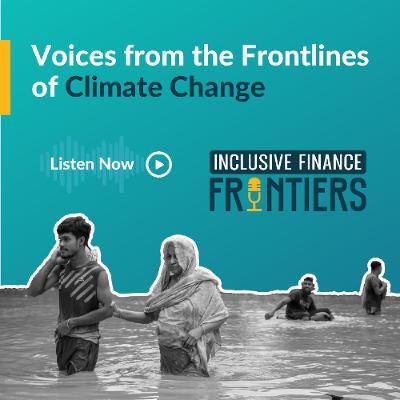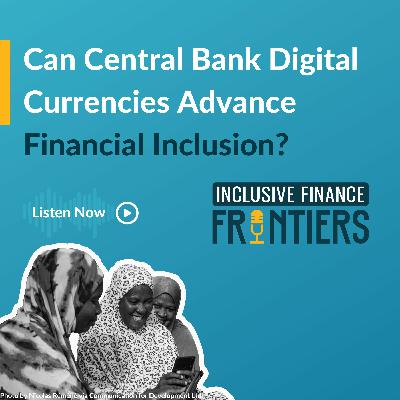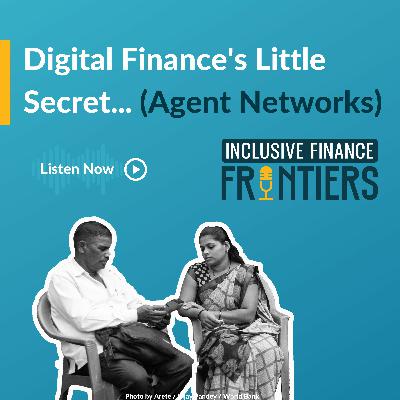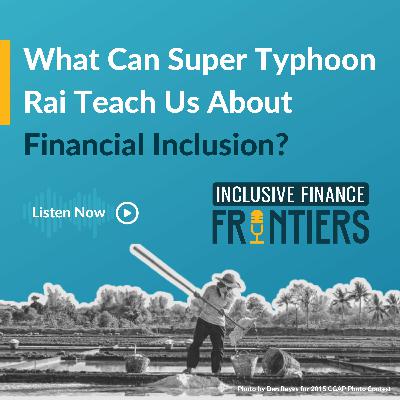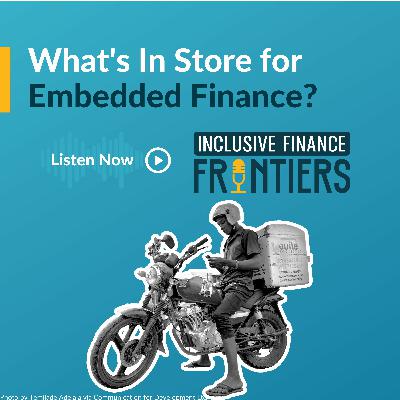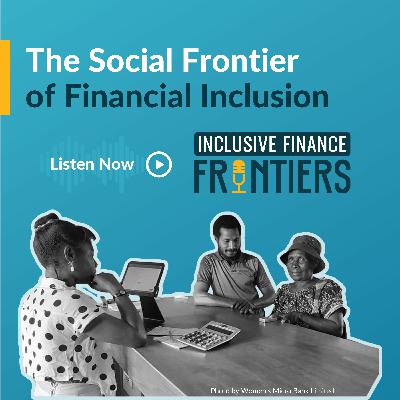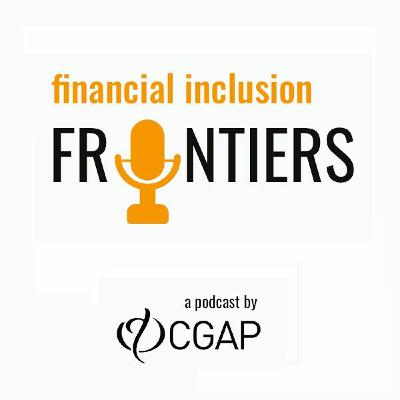Discover Inclusive Finance Frontiers
Inclusive Finance Frontiers
14 Episodes
Reverse
The world faces a variety of ‘global risks’, ranging fromgeopolitical conflicts and climate change to cyber threats. These are growingever more complex and affect all of us. However, people and small enterprises in low-income countries face disproportionate challenges. If left unaddressed, this can create ripple effects regionally and globally. Government-led strategies remain vital, but the intensifying risks underscore the urgent need for approaches that put solutions directly into the hands of communities most vulnerable to risks and can complement government-led strategies.
In June 2025, CGAP convened nearly 200 global decisionmakers in Amsterdam involved in global resilience responses for a Symposium titled, “RethinkingResilience: Why Inclusive Finance Can’t Wait”. Inthis bonus episode of Inclusive Finance Frontiers, hear from participants interviewed on the sidelines of the Symposium on how inclusive finance tools—such as savings, credit, insurance, and digital payments—can strengthenresilience for those most at risk and drive sustainable development.
Featured voices:
Michel Liès, Chairman of Zurich Insurance Group and Insurance Development Forum
Stéphane Hallegatte, Chief Climate Economist at the World Bank
Stuart Rutherford, Director of Hrishipara Daily Diaries Project
Sophie Sirtaine, CGAP CEO
In 2019, Lebanon witnessed the start of one of the most severe socio-economic crises globally since the mid-nineteenth century, plunging many Lebanese into poverty.
Amid the hardships, a new hope emerged in 2021. The World Bank set up a $246 million social safety net project and the Government of Lebanon (GoL) designed a registration platform for this program, with the help of Siren Associates, called DAEM (Arabic for "support"). Built in record time, DAEM is more than just a registry; it’s a fully localized social protection system that provides a lifeline to Lebanese families hit by crisis.
In this episode, we hear from the GoL, CGAP, the World Bank, and Siren Associates about how collaboration was key to DAEM’s success and how, even in the most challenging conditions, it’s possible to design solutions that go beyond emergency relief and sow the seeds for a more inclusive financial system.
This is Season 2, Episode 6 of CGAP's podcast, Inclusive Finance Frontiers.
Featured Voices
Ahmed Fatih Ortakaya, Senior Social Protection Specialist, World Bank
Carole Alsharabati, Research Director, SIREN Associates
Marie Louise Abou Jaoudeh, Presidency of the Council of Ministers (PCM) of the Government of Lebanon
Nadine Chehade, Senior Financial Sector Specialist, World Bank
Souraya Sbeih, Consultant, CGAP
Listen and subscribe for free on your favorite platform. To learn more, visit www.cgap.org. To share feedback, connect with us at podcast@cgap.org.
This episode incorporates a news report from PBS NewsHour, Financial crisis leads some in Lebanon to rob banks to access their money.
The climate crisis demands urgent global action. Green technologies—like solar panels and clean cookstoves—have the potential to transform lives and protect the planet but remain out of reach for many in developing economies. Can carbon markets make them more accessible?
Voluntary carbon markets (VCMs), where companies purchase carbon credits to offset greenhouse gas emissions, are rapidly gaining traction. These markets hold immense potential to enable the adoption of green technologies among low-income households on the frontlines of climate change and improve their lives.
In this episode, we take a deep dive into VCMs to hear from ATEC about their pay-as-you-go electric cookstoves, which aim to decarbonize cooking through verifiable tech, how Gold Standard issues carbon certifications, and why CGAP sees a promising role for financial services in supporting more inclusive carbon markets.
Featured Voices:
Ben Jeffreys, CEO, ATEC
Vikash Talyan, Senior Director of Standard Development and Innovation, Gold Standard
Max Mattern, Senior Financial Sector Specialist, CGAP
Listen and subscribe for free on your favorite platform. To learn more, visit www.cgap.org. To share feedback, connect with us at podcast@cgap.org.
Artificial intelligence (AI) is already transforming almost every aspect of the financial services industry. It is driving efficiencies and sparking innovation by reshaping the way financial authorities protect consumers—not just how financial service providers operate. But financial authorities need to walk a tightrope. While they need to harness the power of AI to improve consumer protection, they must also address the novel risks and challenges that AI brings, such as new forms of financial fraud, cyber threats, and data privacy concerns.
This episode explores how the Central Bank of the Philippines is embracing AI-powered "SupTech” (supervisory technology) for its chatbot named BOB to enhance financial consumer protection. We'll hear from experts at the Central Bank of the Philippines, the Cambridge SupTech Lab, and CGAP about the potential benefits and risks of this revolutionary technology.
Featured Voices:
Charina B. De Vera-Yap, Director of the Consumer Protection and Market Conduct Office (CPMCO), Regional Operations and Advocacy Sector, Bangko Sentral ng Pilipinas (BSP)
Matt Grasser, Co-Head and Tech Lead, Cambridge SupTech Lab and Principal Technologist at Cambridge Centre for Alternative Finance (CCAF)
Juan Carlos Izaguirre, Senior Financial Sector Specialist, CGAP
Eric Duflos, Senior Financial Sector Specialist and Consumer Protection Lead, CGAP
Listen and subscribe for free on your favorite platform. To learn more, visit www.cgap.org. To share feedback, connect with us at podcast@cgap.org.
In Brazil, the banking world is changing fast. Open Finance allows people in Brazil to securely share their financial data across financial service providers, sparking competition and innovation among providers. This empowers customers to compare and choose services that best meet their needs. But how does open finance work in practice and what does it mean for the millions of people still excluded or underserved by formal finance?
In this episode, we talk to experts at the Central Bank of Brazil, Nubank, and CGAP about Brazil’s experience in rolling out open finance and how data can help unlock credit for informal workers, improve product offerings, and reach wider segments of society. Along the way, we tackle critical questions: Can open finance help reduce inequality? And what lessons can other countries learn from Brazil’s rapid adoption?
Featured Voices:
Matheus Rauber, Senior Advisor, Financial System Regulation Department, Central Bank of Brazil
Rafael Wowk, Head of Regulatory Affairs, NuBank
Maria Fernandez Vidal, Senior Financial Sector Specialist, CGAP
Listen and subscribe for free on your favorite platform. To learn more, visit www.cgap.org. To share feedback, connect with us at podcast@cgap.org.
From a duka in Kenya, a tienda de barrio in Colombia or a kirana in India, micro-retailers that stock fast-moving consumer goods go by many different names around the world. No matter what they’re called, they’re universally cherished. And yet, they face numerous unique challenges.
B2B e-commerce startups like Wasoko in Kenya and &frnds in Southeast Asia are promising to make a difference for micro-retailers by digitizing order processes and extending buy-now-pay-later credit options. Yet challenges remain: How do we bridge the digital divide? And can these systems sustainably scale?
In this episode, a Behavioral Science thought leader joins experts from Flourish Ventures and CGAP to explore the promise—and the hype—behind this digitization wave, unpacking its potential to create meaningful financial inclusion for micro retailers at the last mile.
Featured Voices:
Richard Wright, former Behavioral Science Director at Unilever and currently an independent consultant
Stella Klemperer, Director of Strategy and Insights, Flourish Ventures
Alexander Sotiriou, Senior Financial Sector Specialist, CGAP
Listen and subscribe for free on your favorite platform. To learn more, visit www.cgap.org. To share feedback, connect with us at podcast@cgap.org.
Special thanks to Salome W. Kimani for conducting the interview with the micro-retailer Mugi and for the voiceover.
Everyone in the world is grappling with climate change, but for those on the front lines, it’s a daily struggle for survival. In this episode, we travel to Bangladesh to speak with Nurul and Sita, two farmers who are fighting to protect their homes and livelihoods from relentless storms, flooding, and rising sea levels. Nurul and Sita are both dealing with climate change, but only one has the help of microfinance--and that’s made quite a difference.
How do people living in poverty prepare for, cope with, and adapt to climate shocks, and what role do financial services—like loans, savings and insurance—play in supporting them? Join us as we share findings from research by CGAP, MicroSave and Decodis to explore these questions and uncover the potential of inclusive finance in bringing hope, resilience, and lasting change to the communities hardest hit by our warming world.
Featured Voices:
Nurul, a farmer from Bangladesh
Sita, a farmer from Bangladesh
Graham Wright, Founder and Group Managing Director, MicroSave
Claudia McKay, Green and Resilient Outcomes Lead, CGAP
This episode incorporates news reports from Global News, “Cyclone Remal leaves several dead across Bangladesh and India” and the Associated Press, “Hundreds of thousands without power in Bangladesh after cyclone causes severe flooding”.
Central banks have been eying the emergence of privately issued digital currencies with a mix of excitement and anxiety and some began experimenting with their own versions of crypto: central bank digital currencies (CBDCs). Advocates say CBDCs offer an alternative to private digital currencies that will enable central banks to retain their control over national monetary supplies, better combat money laundering and fraud, and even advance financial inclusion.
But are CBDCs really the game-changer for financial inclusion that many claim? What are the key enablers and constraints to CBDCs advancing financial inclusion? And how are central banks thinking about designing CBDCs to ensure that they achieve their goals?
This is the fourth episode in CGAP's new podcast, Inclusive Finance Frontiers.
Featured Voices
- Kwame Oppong, Head of Fintech and Innovation, Bank of Ghana
- Mahesh Uttamchandani, Global Practice Manager for the World Bank Group’s Financial Inclusion, Access and Infrastructure between January 2018 and September 2022 and currently the World Bank’s Practice Manager for Digital Development in East Asia and the Pacific
- Nana Yaa Boakye-Adjei, Senior Consultant, the World Bank between May 2020 and January 2023
- Tanja Hessdörfer, Head of Sales and Business Development CBDC at Giesecke+Devrient
- Mehmet Kerse, Senior Consultant on Digital Finance and Financial Inclusion, CGAP
The wide reach of digital financial services, such as digital savings, credit, payments, insurance or investment products, can unlock life-changing opportunities for low-income consumers by helping them save, borrow, and receive remittances. But here’s a little secret about the seemingly endless array of these digital services: their current ability to attract and serve new users largely depends on the expansion of old-fashioned physical interaction through agent networks. These networks enable users to deposit or withdraw cash from digital accounts, which is crucial in cash economies where digital finance has limited use cases. Expanding these networks beyond large cities is notoriously difficult, but significant progress has been made in recent years — and in surprising ways. In this episode, we explore the latest advances in agent networks and what they mean for the future of inclusive finance.
#inclusivefinance #financialinclusion #digitalfinance #gendernorms #papuanewguinea
Featured Voices:
• Emilio Hernandez, Senior Financial Sector Specialist, CGAP
• Sasidhar Thumuluri, Managing Director and CEO, Sub-K
• Archana Pandey, General Manager, Financial Inclusion at Bank of Baroda
• Sandhya Rani, Sub-K rural agent
Special thanks to Anand Raman, CGAP consultant based in India, for his help in leading interviews with Sub-K agents and customers.
Typhoon Rai made landfall in the Philippines in December 2021, killing over 400 people, devastating 1.5 million homes, and causing over US$1 billion in damage. Extreme weather events like Rai are becoming more common as a result of climate change. Financial services can make households more resilient and adaptive, but too often the people who are most vulnerable to these shocks—such as women, poor people, forcibly displaced people, and people in rural areas—are also financially excluded. In this episode, we travel to the Philippines to speak with a Typhoon Rai survivor and the insurance provider that helped her rebuild her home, as we explore the changing role of insurance and other financial services in climate change mitigation and adaptation.
The spread of digital technology and infrastructure has given rise to fintech, but it’s also driven the popularity of non-financial services like social media apps, gig platforms, and e-commerce sites. The term “embedded finance” refers to the integration of financial tools into this growing array of services. Just as mobile money brought payments closer to low-income customers via their phones, embedded finance has the potential to bring a whole range of financial services even closer. The opportunities this presents to advance financial inclusion are almost endless and may define financial inclusion for years to come. But what forms will embedded finance take? What are the biggest opportunities and risks? And what players are driving it in different regions? In this episode, we take a look at what lies ahead for embedded finance.
What are the frontiers of financial inclusion? Of course, there is a geographical frontier: people in rural areas are more often excluded from the financial system. There’s also a technological frontier: while digital technology has greatly expanded the reach of financial services, those on the other side of the digital divide are being left behind. But there’s also a social frontier, often in the form of social norms that dictate who can – and can’t – access and use financial services. In this episode, we hear from Women’s Micro Bank (also known as Mama Bank), a bank in Papua New Guinea that pushed geographical and technological boundaries in its attempts to expand rural women’s access to banking services but ran into its biggest challenges at the social frontier.
If you’ve ever suspected that privacy policies aren’t really written to help you make informed decisions about how companies use your data, then this episode is for you. Privacy and consumer financial services expert David Medine discusses the risks that millions of low-income consumers face in developing countries as they start using digital financial services. He then describes an approach to taking data protection and privacy beyond the consent form and into the 21st century.
For years, digital financial services providers have tried and failed to seize a multi-trillion-dollar opportunity: the large-scale digitization of retail payments in emerging markets. What must providers do differently to make digital payments work better than cash for merchants and their customers? CGAP Senior Financial Sector Specialist Peter Zetterli’s search for an answer led him to a surprising question: What if trying to be better than cash is the wrong approach?


